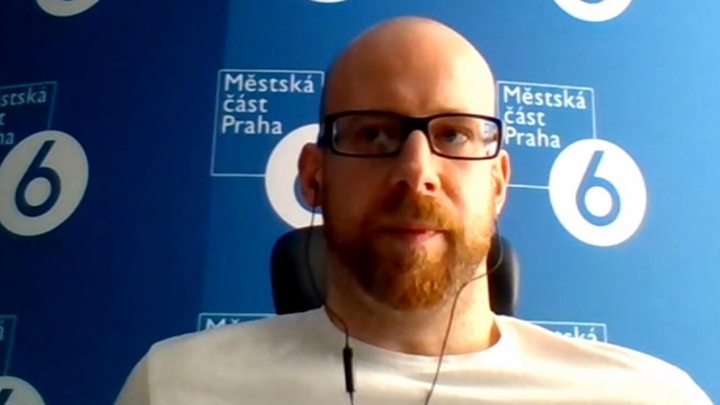
Media playback is unsupported on your device
A Czech politician in hiding amid allegations of a Russian assassination plot says he believes the threat against him is credible and he fears for his life.
Three Prague politicians are under 24-hour police guard because of the alleged plot to poison them - claims categorically denied by Moscow.
"It's very difficult," said Ondrej Kolar, mayor of Prague's sixth district, speaking to the BBC from an undisclosed location under heavy police guard.
"I haven't seen my children for quite a long time, and they haven't seen me. Even my family doesn't know where I am," he told me via Skype, now his only means of communication with the outside world.
I vaguely know Mr Kolar. We both once worked at New York University in Prague.
His bright blue cardboard backdrop, with the words "Prague 6 Municipal District", looked familiar. Then I remembered.
The last time we met was shortly before a vote at Prague 6 district council to move the bronze statue of Soviet Marshal Ivan Konev. That World War Two commander was many things, but historians agree he was not, as the plinth once claimed, the "liberator of Prague".
The statue was erected in 1980, but Konev was a controversial figure who oversaw the Soviets' brutal suppression of the 1956 Hungarian Uprising and helped crush the Prague Spring of 1968.
The Russian government has reacted angrily to the monument's removal and has even threatened legal action.
Mayor Kolar was leading the council meeting and I had to wait. I sat in an antechamber - under a large, bright blue screen. He had apparently taken the screen to his undisclosed hiding place.
"There are things I cannot comment on. But what I can say is that both the Czech police and the secret service do have some intel that there might be a threat directly from the Russian side," he told me.
Echoes of a spy novel
The nature of that threat, first elucidated in a brief but explosive piece in the investigative Czech weekly Respekt, is straight out of a spy novel.
Three weeks ago, claimed the publication, citing unnamed intelligence sources, a man travelling on a Russian diplomatic passport arrived at Prague airport carrying a suitcase containing the deadly poison ricin.
According to the report, he was picked up by a car bearing Russian diplomatic plates and taken to the Russian embassy, not far from Ondrej Kolar's office in Prague 6.
Czech intelligence services, Respekt claimed, deemed the man to be a direct threat to two city politicians who had angered Moscow in recent months: Ondrej Kolar, and Zdenek Hrib, the capital's mayor.
Mr Hrib recently oversaw the renaming of the area in front of the Russian embassy as Boris Nemtsov Square, honouring a prominent opponent of President Vladimir Putin murdered in 2015.
The following day another publication, Denik N, claimed a third critic of Moscow - local mayor Pavel Novotny - was also receiving police protection.
Officials tight-lipped
The denials from Russia were swift and unequivocal. The report, said the embassy, had "absolutely no basis". Mr Putin's spokesman Dmitry Peskov dismissed the news report as "fake".
Nor was there confirmation or much in the way of comment from Czech authorities.
A foreign ministry spokeswoman told the BBC they would "not comment on the leaks published in the media", although she did confirm that an accredited Russian diplomat had arrived at the airport, presumably on one of the few flights still running during the coronavirus lockdown.
As the jaw-dropping allegations flashed around the world, prompting a mixture of outrage, disbelief and ridicule, journalists and diplomats began working their phones. There was - there is - persistent scepticism, including amongst seasoned Russia-watchers.
Assassinating the mayor of a European capital would be tantamount to an act of war. It would be so counter-productive to the Kremlin it would be simply insane.
And yet.
From a source within Czech counter-intelligence, there was… not confirmation exactly. But far from a denial. The media reports, the source told me, were grounded in factual information.
Ondrej Kolar is not taking any chances.
"We know what happened in the past with the Russian secret service and its agents trying to poison Mr Skripal with a nerve agent," he told the BBC.
Russian former spy Sergei Skripal and his daughter were poisoned in Salisbury in 2018, by agents thought to have been sent by Russian intelligence.
"When they have the guts to do this in the United Kingdom, why not do it in Prague?"
from Hacker News https://ift.tt/2xtWetF
No comments:
Post a Comment
Note: Only a member of this blog may post a comment.